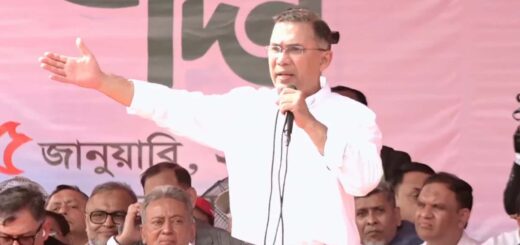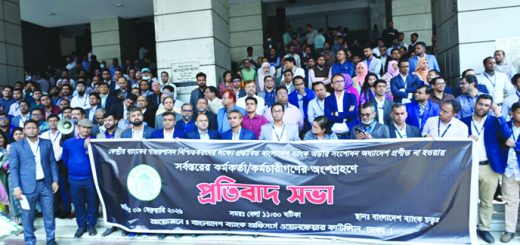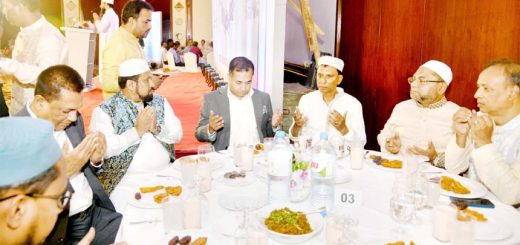Book Review: Tin Bigha Jomi

The book deals with the famous statement ‘ All happy families are same, every unhappy family is unhappy according to its own kind’ of Anna Karenina by Leo Tolstoy . If this term is re-stated in the discussion of economics it may stand like this “All the developed countries are same but the developing ones are having specialties of their own kind.” Though there are some similarities in the field of agriculture and food field with some other developing countries most of the cases dissimilarities lay among the developing countries in the light of socio-economic and political management, agricultural stories.
In the agriculture of Bangladesh, the influence and impact of three bighas of land is discernable. In most of the villages about 60% families own land less than three bighas. Cultivated land (own or share cropping) most families have less than three bighs as of land. If a family can cultivate around three bights of land, they can run somewhat without meeting the hunger. Above all, a large number of farmers are marginalised who own on an average three bighas of land. Thus three bigha has has a symbolic value in this agricultural country. If they cannot change their life they can meet a miserable future. The book has been named keeping these factors in consideration.
Food and agriculture of Bangladesh have gone under research which has also claimed recognition from home and abroad. And the books containing agricultural nature and issue are mostly in English. It is hardly known whether there is any analytical book reflecting the evolution and development in agriculture in Bengal. To meet up that demand of the readers and to fill that gap the authors have ventured to develop this book.
The book has accommodated 141 articles in fifteen chapters squeezed into 386 pages. Food security, using land and crop policy, technological development of producing rice , the farmers’ income and its management of distribution, learning from food crisis, experience in food security, climate change and food security , recommendations on agriculture and food law constitute the important chapters of the book produced by two famous agricultural economists and researches namely Abdus Bayes and Mahbub Hossain.
With the economic development the importance of agriculture becomes less in developed countries but the case of Bangladesh is different. It is true that the contribution of agriculture to GDP has reduced still half of the manpower is related to agriculture and the sustainable food security of Bangladeshi people depends on the overall development of agricultural field. The global agricultural picture particularly the Asian rice producing countries’ trend has been discussed in this book. It says that Thailand has occupied one third of the whole rice market of the world. On an average farm size of the country is five hectares which is the largest one in south and south-east Asian countries and ten times greater than Bangladesh. The lion’s share of the rice production is dependent on rain water. Rice produced by irrigation project grown in the central and northern areas is only 20 percent of the whole production. Here the production of rice has increased 1.7 tones in 1983 to 3.1 ton in 2008. The rate of production comparing to other countries in per hectare is less but they export half of the rice because per head consumption rate has decreased and rice is grown in vast land. India was rice importing county in the sixties. Now she has occupied the position of one of the rice exporting countries due to green revolution. Her rice production also rain water dependent which may hamper in future due to climate change. Moreover, per head rice consumption has increased in eastern states which may lessen their exporting ability in future.
The thirteenth chapter tells us the experience of food security, it strategy and principle. Rice and wheat are the main food of the global people and the important characteristics are the fluctuating of their price which is different from other things. And this change is very dangerous which appeared before humans in 1973 and 74 and then again in 2007 and 2008. Bangladesh faced a serious critical situation when the price of rice increased 65 percent. 90percent of her people live on rice who experienced an unprecedented situation because of this price hike of their staple food. It is true that we have produced rice three times in forty year but every year eighteen lakh new people join the existing procession of people who need more four lakh tons of rice which proves to be a gigantic task.
The last line of the ‘Ode to the West Wind’ of Percy Bysshe Shelly’ If Winter comes, can Spring be far behind?’ gives the poet hope that his poetic ability will again improve and increase. He has just before this, in the poem, berated himself for not having his words and his poetry reach far enough. In the same way the fluctuation of the price of rice might bring some positive results being influenced by the trend of globalisation. The supply of rice to the global market has been squeezed because the prime rice producing countries of Asia have seen their irrigation technology at their last stage and the gross domestic product reduction. The increasing demand of rice and against it, the decreasing amount of production has contributed to increasing the price of rice from the bottom to the up. Adverse environmental situation and frequent natural calamities also hastened to send the rice production at the slanting trend which the book has recorded in detail and can be a valuable document for the agricultural economists as well as the environmentalists who are concerned about the lower production of rice.
“Food security exists when all people, at all times, have physical and economic access to sufficient, safe and nutritious food which meet their dietary needs and food preferences for an active and healthy life” as the World Food Summit told in 1996. Food security encompasses many issues ranging from food production and distribution to food preferences and health status of individuals. The concern and global theory of food security expressed in this book also go in line with global concern and theory of food security. Global warming induced heat waves, drought, and flooding constitute a global food security emergency for us all today and the book reminds us the same concerns and pictures. Changes in climate are already affecting the sustainability of agricultural systems and disrupting production. As the book is printed in Bengali, it can earn popularity among the agriculturists, agricultural economists, general economists and even the common people who can easily grasp the ideas of the recent important issues of globalization. The book begins with Tagore’s quotation and ends with the story of Paul Samuelson through a story where a farmer lost his ass and found it thinking just like an ass. Similarly we need to find out the solutions to the agricultural and food security fields thinking practically and thinking just like our farmers. Living in the air-conditioned palaces we will hardly find the solutions to these issues. -Masum Billah
(Program Manager: BRAC Education Program and Vice-President: Bangladesh English Language Teachers Association (BELTA) Email: [email protected])







